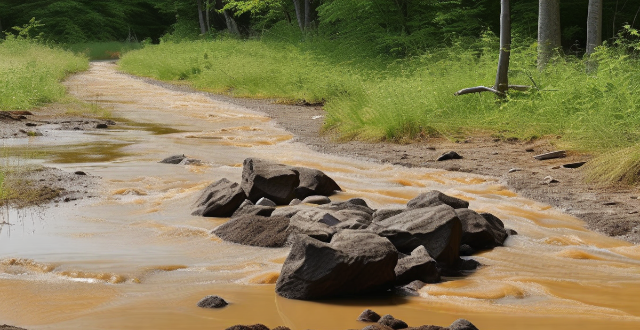Deforestation contributes to water cycle disruption through soil erosion, surface runoff, and groundwater depletion. This leads to droughts, flooding, pollution, water scarcity, and climate change. Sustainable forest management is crucial to mitigate these effects.

How Does Deforestation Contribute to Water Cycle Disruption?
Deforestation is a major contributor to water cycle disruption. It has several negative impacts on the hydrological cycle, including soil erosion, surface runoff, and groundwater depletion. In this essay, we will explore how deforestation affects the water cycle and its consequences.
Soil Erosion
Deforestation leads to soil erosion, which is the process of soil particles being carried away by wind or water. This causes a loss of nutrients from the soil and reduces its ability to absorb water. As a result, there is less water available for plants and animals, leading to droughts and other water-related problems.
Surface Runoff
Deforestation also contributes to surface runoff, which is when rainwater runs off the land surface into rivers or lakes. This can lead to flooding and other water-related disasters. Additionally, surface runoff can carry pollutants such as fertilizers and pesticides into nearby bodies of water, harming aquatic life.
Groundwater Depletion
Deforestation also affects groundwater levels by reducing the amount of vegetation that helps to filter out pollutants in the ground. This allows pollutants to seep into the groundwater, which can be harmful to humans and other organisms. Additionally, deforestation can cause subsidence, which can reduce the amount of groundwater available for use.
Consequences of Deforestation on the Water Cycle
The consequences of deforestation on the water cycle are far-reaching and include:
1. Droughts: Deforestation reduces the amount of vegetation that helps to hold moisture in the soil, leading to more frequent and severe droughts.
2. Flooding: Surface runoff caused by deforestation can lead to flooding, which can damage infrastructure and harm people's lives.
3. Pollution: Deforestation increases the amount of pollutants in the environment, which can harm aquatic life and human health.
4. Water scarcity: Deforestation reduces the amount of water available for humans and other organisms, leading to water scarcity and food shortages.
5. Climate change: Deforestation releases greenhouse gases into the atmosphere, contributing to climate change, which can further disrupt the water cycle.
In conclusion, deforestation is a major contributor to water cycle disruption through soil erosion, surface runoff, and groundwater depletion. The consequences of deforestation on the water cycle are numerous and include droughts, flooding, pollution, water scarcity, and climate change. To mitigate these effects, it is important to prioritize sustainable forest management practices that protect ecosystems and prevent deforestation.